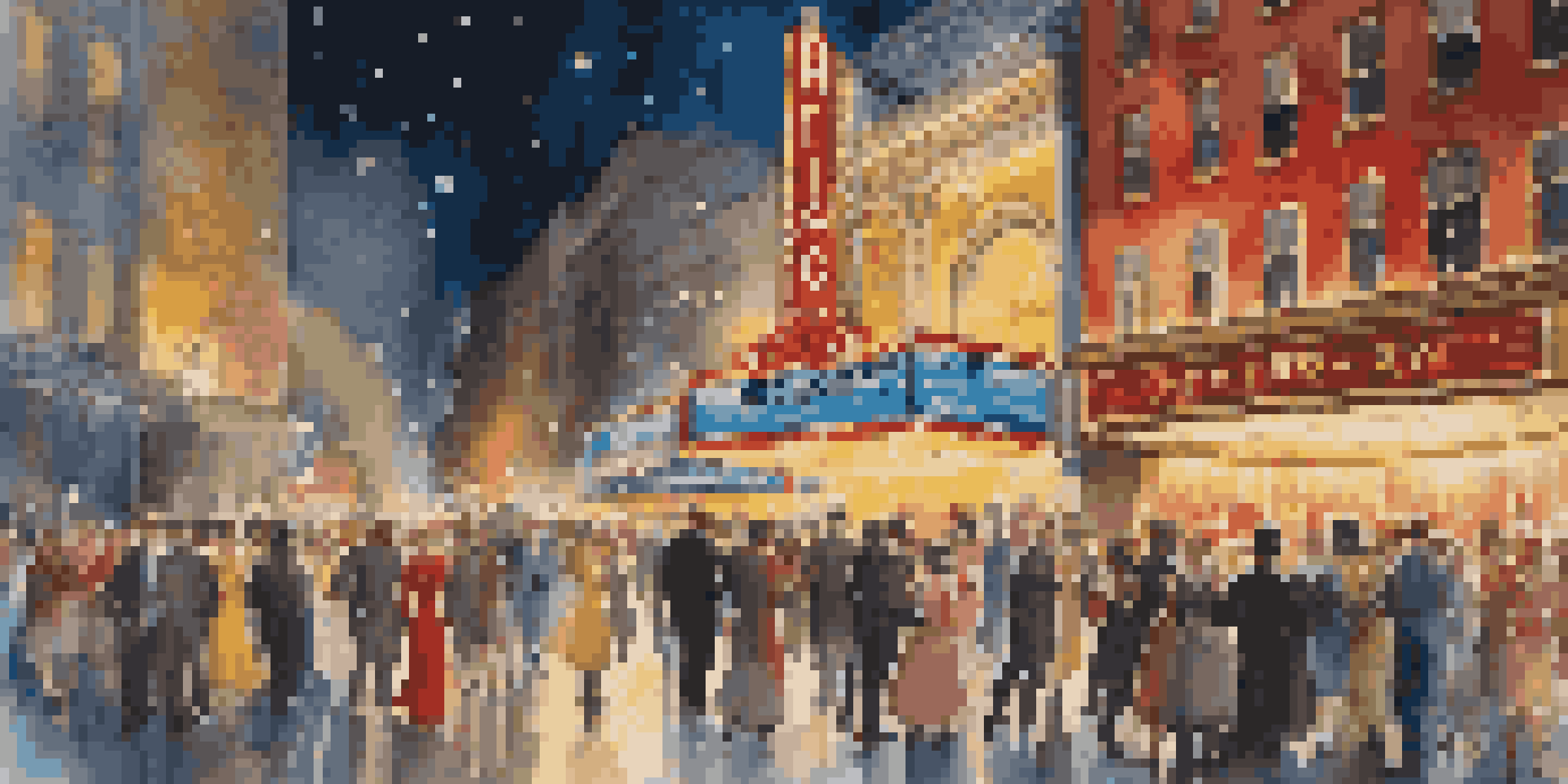The Cultural Impact of Musical Theatre: A Historical Overview

The Origins of Musical Theatre in the 19th Century
Musical theatre has its roots in the 19th century, where it began blending various forms of entertainment, such as opera and vaudeville. This period marked the rise of shows that combined dialogue, song, and dance, captivating audiences across the globe. Early productions laid the groundwork for what we now consider classic musicals, showcasing the potential of storytelling through music.
Musical theatre is a way of telling stories that allows for a deeper understanding of the human experience.
One of the earliest influences was the operetta, which introduced light-hearted themes and catchy melodies. Gilbert and Sullivan's works, for example, became iconic for their wit and humor. These productions not only entertained but also reflected societal norms and issues, making them relevant and relatable to audiences of that time.
As musical theatre evolved, it began to mirror the changing world around it. The Industrial Revolution and urbanization created new social dynamics that musicals explored, paving the way for a genre that would grow increasingly reflective of contemporary culture.
The Golden Age of Broadway and Its Social Reflections
The mid-20th century is often referred to as the Golden Age of Broadway, marked by legendary shows and unforgettable scores. Musicals like 'Oklahoma!' and 'West Side Story' not only entertained but also tackled serious themes such as love, prejudice, and social justice. This era showcased how musical theatre could engage with pressing societal issues while captivating audiences.

'West Side Story,' in particular, brought to light themes of racial tension and cultural conflict, resonating deeply with the social movements of the 1960s. The powerful storytelling, combined with Leonard Bernstein's music and Stephen Sondheim's lyrics, created a poignant reflection of urban life. Such productions demonstrated that musical theatre was not just escapism but a powerful platform for social commentary.
Musical Theatre's Social Impact
Musical theatre has historically reflected societal issues, using storytelling to engage audiences on topics like love, prejudice, and social justice.
In addition to addressing societal issues, the Golden Age also saw the rise of diverse narratives. This shift allowed for a broader representation of experiences, paving the way for future generations of musicals that would further explore identity, culture, and community.
The Role of Musical Theatre in the Civil Rights Movement
Musical theatre played a significant role during the Civil Rights Movement, serving as a vehicle for both expression and activism. Productions like 'The Wiz' and 'Hair' offered new perspectives on race and social justice, resonating with audiences who were grappling with the changing social landscape. Through music and performance, these shows highlighted the struggles and triumphs of marginalized communities.
Theatre is a safe space to explore the complexities of our society and culture, and musical theatre does this with an added layer of emotion through song.
The impact of these musicals was profound, as they inspired dialogue and action. 'Hair,' for instance, not only celebrated counterculture but also addressed issues of war and inequality. The blend of rock music and theatrical performance captured the spirit of a generation longing for change, illustrating how art can be a catalyst for social transformation.
Furthermore, the popularity of these productions helped to bridge cultural divides, fostering understanding and empathy. By bringing diverse stories to the forefront, musical theatre contributed to a greater awareness of civil rights issues and the importance of inclusion in society.
The Evolution of Musical Styles and Cultural Influences
As musical theatre progressed into the late 20th century, it began to incorporate a variety of musical styles, reflecting the eclectic nature of contemporary culture. From rock and jazz to hip-hop and pop, shows like 'Rent' and 'Hamilton' showcased the versatility of musical theatre. This evolution not only attracted new audiences but also broadened the genre's appeal across different demographics.
For example, 'Rent' brought the struggles of a generation to the stage, addressing issues like poverty, addiction, and LGBTQ+ rights. Its rock score and relatable characters resonated with younger audiences seeking authenticity and connection. This shift demonstrated how musical theatre could evolve in response to changing cultural landscapes while maintaining its core mission of storytelling.
Cultural Exchange in Global Musicals
The globalization of musical theatre has fostered cultural exchange, allowing diverse narratives to enrich the genre and connect audiences worldwide.
The incorporation of diverse musical styles has also allowed for cross-cultural collaborations, enriching the genre further. This blending of influences has resulted in innovative productions that celebrate global narratives, emphasizing the universal themes of love, struggle, and hope.
The Globalization of Musical Theatre and Cultural Exchange
In recent decades, musical theatre has experienced globalization, with productions emerging from various countries and cultures. This trend has facilitated cultural exchange, as international shows like 'The Lion King' and 'Mamma Mia!' have made their way to stages around the world. As a result, audiences are exposed to a rich tapestry of storytelling that reflects diverse perspectives and traditions.
Moreover, this globalization has opened doors for local artists to adapt and create unique interpretations of classic musicals. For instance, Asian adaptations of Western musicals have introduced new cultural elements, enriching the narratives while honoring their origins. This phenomenon highlights the adaptability of musical theatre, making it a truly global art form.
Through globalization, musical theatre has fostered a sense of community among artists and audiences alike. By sharing stories from different cultures, it encourages empathy and understanding, ultimately bridging gaps and celebrating our shared humanity.
The Impact of Technology on Musical Theatre Production
Advancements in technology have transformed the world of musical theatre, enhancing production quality and audience engagement. From elaborate set designs to sophisticated lighting and sound systems, productions can now create immersive experiences that captivate viewers. This technological evolution has elevated the storytelling potential of musicals, making them more dynamic and visually stunning.
Additionally, the rise of digital media has expanded the reach of musical theatre. Streaming platforms and social media have allowed productions to connect with audiences beyond the traditional theatre space. For example, the filmed version of 'Hamilton' introduced the groundbreaking musical to millions who may never have had the chance to see it live, demonstrating how technology can democratize access to the arts.
Technology's Role in Theatre Evolution
Advancements in technology have transformed musical theatre production, enhancing audience engagement while raising questions about the future of live performances.
However, this shift also raises questions about the future of live performances. While technology can enhance the experience, the essence of live theatre lies in its immediacy and connection between performers and audiences. Striking a balance between innovation and tradition will be crucial as musical theatre continues to evolve in a digital age.
The Future of Musical Theatre and Its Cultural Significance
Looking ahead, the future of musical theatre is filled with potential and promise. As new voices and stories emerge, the genre is likely to become even more inclusive, reflecting the diverse experiences of our society. This evolution will not only enrich the art form but also resonate with audiences seeking representation and authenticity in storytelling.
Moreover, the growing emphasis on social issues within musicals suggests that the art form will continue to serve as a platform for activism. Productions addressing topics like climate change, mental health, and inequality will likely gain prominence, encouraging dialogue and inspiring action. Musical theatre has always had the power to provoke thought and challenge norms, and this trend is expected to persist.

Ultimately, the cultural significance of musical theatre lies in its ability to connect people across generations and backgrounds. By weaving together stories that reflect our shared humanity, it will remain a vital part of our cultural landscape, fostering understanding and unity in a rapidly changing world.